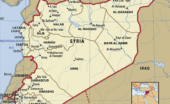Johannah Bernstein post: "eternally proud of my father’s extraordinary aeronautical engineering. legacy. here is a photo of the Canadair Water…
Wednesday Night #1726 with Marko Papic
Written by Diana Thebaud Nicholson // April 1, 2015 // Wednesday Nights // Comments Off on Wednesday Night #1726 with Marko Papic
And in a timely announcement on Thursday morning:
Ukraine signed a deal for Russian gas. Naftogaz, Ukraine’s state gas company, has signed a deal with Russia’s Gazprom to secure gas deliveries through the end of June. Ukraine will pay $248 per thousand cubic meters, lower than the previous quarter’s $329; the deal was hailed as economic progress amid animosity between the two countries.
P R E L U DE
May we say how delighted we are to see the end of March 2015 – what a brutally long winter this has been!
Marko Papic, BCA Senior Geopolitical Strategist, will join us to discuss his recently published special report on Russia. Three key points:
All actors involved in the conflict over Ukraine appear to be constrained by real, material factors;
Expect geopolitical tensions to continue to de-escalate;
The end game for Ukraine is that it will not be allowed to enter Western economic and military institutions.
The report argues that: To make a case for de-escalation, we also need to examine the potential for an end game in Ukraine.
In our view, the end game for Ukraine is not dissimilar to the situation in a number of other post-Soviet states. A frozen conflict in the Donbas region will give Moscow a major lever on Kiev, particularly on the latter’s aspirations to join the West’s sphere of influence (EU and NATO). There is no way that the Europeans will want to integrate Ukraine into their institutions if the country is in a constant state of conflict with Moscow.
Marko’s background is in private intelligence and academia. Prior to joining BCA he was a Senior Analyst for STRATFOR, where he contributed to the firm’s global geopolitical strategy as well as its analyst recruitment and training program. Marko is a sought after geopolitical strategist, having been interviewed by numerous media organizations – including The New York Times, CNN, BBC, CNBC, Al Jazeera, Associated Press, etc. Before joining BCA, he also helped create the Center for European Union Studies at the University of Texas at Austin. Born in Serbia, he has lived in eight countries across three continents.
We are truly fortunate to have him with us, espcially as he has written written quite extensively on most of the issues on our plate. From UK elections to Yemen.
And, as a bonus, Helen Fotopulos will join us, contributing her experiences as an elections observer in Ukraine, the former Yugoslavia and ex-Soviet territories.
We wonder if either will care to comment on Chris Alexander’s (to us) bizarre rant and the counter argument by former ambassador to Russia Chris Westdal: Mr. Alexander’s fantasy Cold War. We can only be thankful that Mr. Alexander is not the minister for DFAIT or whatever it is called this week.
Given the current geopolitical situation, discussion will surely not be limited to Russia and Ukraine and will certainly include whatever outcome there is (or not) of the nuclear talks with Iran. Tuesday’s Quartz brief is not optimistic: Time finally runs out for a deal on Iran’s nuclear program. The chances of a last-minute accord don’t look good, and if there isn’t one, expect Iran to ramp up its program and the US to ramp up sanctions. The Guardian offers a concise run-down of the state of the negotiations and the sticking points. The WSJ is slightly more optimistic, noting that Russian Foreign Minister Sergei Lavrov’s return to the talks [after a brief absence] may signal a political agreement can be reached before the deadline. Russia – again. Just how close are the ties between Russia and Iran? Although six-months old, this analysis Looking behind the Russia-Iran relationship from Al-Monitor may contain some clues.
Yemen has taken over the spotlight in the Middle East, pitting the Saudis and their 10-Sunni -nation coalition against Iranian Shia interests in what many view as a proxy conflict. The Yemen situation may also have provided extra stimulus for the Arab League’s announcement of the formation of a joint military force, although that will take both time and lots of good will to put together and as the BBC points out, there are plenty of sceptics. “ In an area as sensitive as military intervention, how much real coordination might be possible across an Arab world that is so often so easily divided?” The ghost of T.E. Lawrence lurks.
Of all that is being written and said about the ISIS and the Middle East imbroglio, Gwynne Dyer’s recent lecture at USF [Gwynne Dyer explains why terrorism is overblown and why Islamists want western countries to attack the Islamic State] included some of the most controversial opinions. His thesis is generally, that the West should ignore the jihadists and they will eventually disappear. Repeatedly characterizing terrorism as a “technique” for revolutionaries “who don’t have an army, don’t have heavy weapons, and don’t have a great deal of money”, he assured his audience that “This [terrorism] is not going to emerge as a global threat. Whatever happens in the Middle East, rather as in the case of Las Vegas, will remain in the Middle East.” Additionally, his dismissive view of Arab capabilities borders on racist. Commenting from Paris, Kimon writes: “In forecasting theory we often talk about seed events. These are isolated incidents, precursors of future trends. To ignore them in their incubation stage and wait for the big numbers before acting could be a grave mistake. It would be like ignoring a cancerous skin sore and then developing lethal melanoma. The cancer analogy is relevant. Terrorists and deranged suicide killers not linked with terrorism, can spread and metastasize. We now see them everywhere, still in small numbers but growing. This not good.”
It comes as no surprise that the House (or rather, the Conservative MPs) has voted to extend the mission against ISIS Government votes to extend, expand military mission against IS
As the Globe & Mail states: The new mission gives Canada a higher profile role as the only Western nation joining the United States in bombing Syria, but also thrusts the Canadian Armed Forces into a more risky and morally murky conflict. Unlike Iraq, Syria has not invited Canada to wage war inside its borders. Both opposition parties voted against, as expected, while Liberal MP Irwin Cotler issued a statement saying he would abstain from the vote, explaining that he believes in the doctrine of responsibility to protect but feels Canada’s bombing within Syria would take pressure off Damascus and “allow Assad to assault Syrian civilians with impunity.” – Once again Mr. Cotler proves that he is indeed an honourable member.
For those who are unsure about the wisdom of Canada’s involvement in the mission, we suggest reading Dr Chris Kilford: Syria a ‘you break it, you buy it’ scenario. It’s an excellent, logical and non-hysterical argument.
Kyle Matthews has been busy as a media commentator on the topic – on Global News: Are the Conservatives politicking with Responsibility to Protect? And on CBC’s The Current Stakes are high as ISIS mission creates political winners & losers
And his CIC colleague Tyler Meredith gets rave reviews for his comments on the Quebec budget In case you missed Wednesday Night’s two David’s debate on Canada/U.S. relations:
David (Jones) U.S.-Canada relations: Keystone has cooled an already frosty relationship
vs.
David (Kilgour) U.S.-Canada relations: With humour and patience, we can remain friends
Lee Kwan Yew has been laid to rest with maximum pomp and ceremony along with media adulation that seemed to know no bounds. The Atlantic took a different tack, however, in The Lee Kuan Yew Conundrum asking Singapore’s late leader governed undemocratically but effectively. Which raises a question: What is the ultimate purpose of government?
And thus to the outcome of the Nigerian elections. Mr Jonathan’s Goodluck has run out (every headline writer will no doubt use a variation of this too-obvious remark) and Muhammadu Buhari has become the first Nigerian to oust a president through the ballot box. Fortunately for him, the margin of victory was over 2 million votes and his predecessor/opponent was gracious in conceding. Now he faces huge challenges cleaning up the mess bequeathed to him including energizing the army to seriously take on Boko Haram.
No, election fever is not over, we can all turn to what AP terms the Most Unpredictable UK Election In Years on May 7. Polls, bookmakers and politics-watchers say the election is too close to call, and no party is expected to win a majority of seats in the House of Commons. This should provide plenty of entertainment for the political junkies among us.
Oh, yes, there is always the ever-entertaining run-up to the 2016 elections, especially now that former Canadian Ted Cruz is in the race.
The media is obsessing over the tragic story of the Germanwings crash, so we will limit ourselves to endorsing any and all comments similar to this in Slate “Using the word “depression” to describe inexplicable or violent behavior sends two false signals: First, that society has no obligations with regard to our happiness—because misery is a medical problem—and second, that a depressed person is in danger of committing abhorrent acts.”
Have you noticed the flood of articles on myopia in children, especially those in East Asia? We were not aware that there was such a high incidence among children – Sixty years ago, 10–20% of the Chinese population was short-sighted. Today, up to 90% of teenagers and young adults are. In Seoul, a whopping 96.5% of 19-year-old men are short-sighted. It is to be hoped that the hypothesis that spending too long indoors is placing children at risk will help to give them a little more time to relax and play in lieu of the hugely competitive studying night and day that is encouraged by their culture and ambitious parents. At the other end of that scale are, of course, the under-age and often indentured workers whose employers, sadly, are not likely to care. There will be a need for much proselytizing.
On a lighter note:
Mayor Coderre is seemingly everywhere, including guest conducting at the OSJM – he’s not bad, but we sincerely hope he will keep his day job.
Obviously the author has never suffered through a parliamentary Question Period, an Ezra Levant rant, or been a Montreal pedestrian … but still, this is a ‘nice’ article.
The largest Baobab in the world is also a bar – a wondrous thing this ancient tree.



